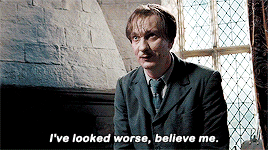Wizarding WReform: Werewolf Rights
Remus Lupin is by far the best Defense Against the Dark Arts teacher in Harry Potter’s time at Hogwarts, but his status as a werewolf cuts his time at the school short. Lupin is just one of many wizards who suffer from a manageable condition that is exacerbated by bigotry. The wizarding world has the power and responsibility to undo the harm that it has caused werewolves and to make their lives much easier.

Firstly, any anti-werewolf legislation needs to be repealed. We don’t know the exact nature of these regulations, but Lupin mentions that Umbridge was responsible for a law that makes it nearly impossible for werewolves to get jobs. Rules such as these keep werewolves from being able to live and support themselves among wizardkind. Beyond actual laws, it is likely quite difficult for werewolves to find stable employment due to both the complications of the condition itself, which may affect their attendance and ability to perform their duties at times, and discrimination if their lycanthrope status is discovered, like Lupin’s expectation that parents of Hogwarts students would want him fired.
There is deep prejudice against werewolves in the wizarding world, as evidenced by Ron’s panicked and aggressive reaction of “Get away from me, werewolf!” upon learning about Lupin (PoA 345). Lupin mentions that he’s “not a very popular dinner guest with most of the community,” which he describes as “an occupational hazard of being a werewolf” (OotP 94). This stigma can be combatted with education, teaching wizards about werewolves not as violent monsters but as their fellow wizards who have an illness that can be managed with appropriate measures.
Werewolves have the ability to live safe, full, productive lives if they have access to necessary resources and accommodations. Wolfsbane Potion makes it possible for a werewolf to retain their human mind during their transformation, thus neutralizing any threat they pose to themselves or others. If it were made freely and easily available, werewolves could function in society without fear. Arthur Weasley tries to comfort his roommate in St. Mungo’s who was bitten by telling him he knows a werewolf who is able to manage his condition, and the Healers try to convince the patient that he can lead “an almost normal life” (OotP 488). Dumbledore was willing to provide a safe location for Lupin to transform, thus making it possible for him to attend Hogwarts as a student, and access to Wolfsbane Potion to make Lupin’s experience as a teacher even easier.
Still, werewolves may need more assistance even getting to a point where they are willing and able to take advantage of the available resources. Werewolves have been maligned for so long that many, according to Lupin, “have shunned normal society and live on the margins, stealing – and sometimes killing – to eat” (HBP 334). They have been forced underground, unable to hold down jobs or live among wizards, facing discrimination everywhere they go. Efforts must be made to reintegrate these werewolves into society, providing social services, financial aid, housing, and career training to help them find their footing.
Above all, werewolves need to be shown compassion. They are not inherently vicious or dangerous – just wizards with a “furry little problem” that their society has the ability to help alleviate.


